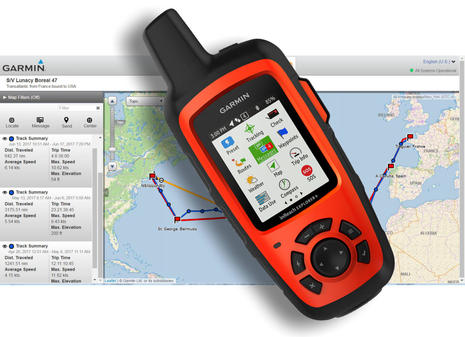AIS, this ‘n’ that #7

I haven’t done one of these AIS miscellaneous entries since last June, but even then was wondering why the FCC hadn’t yet approved Class B! Now it seems like the U.S. marine safety community has gone into a state of depression about it. I’m no longer getting e-mails guessing when the FCC commissioners might finally act, and don’t know of any recent efforts to make that happen. Color me guilty too, though I did turn an April PMY Q&A into a mini editorial on the subject (it’s below the electronics maintenance story some of you helped me with). But I’ve been encouraged to try another avenue, which I’ll describe below, after a few this’n’thats
* First, for motivation, contemplate the chart above, which graphs the daily number of AIS targets seen in U.S. coastal waters from 4/2003 to 4/2008. The increase represents the adoption of Class A and also improvements in the nationwide monitoring system. 6,000 AIS-equipped ships a day is a real safety success, but imagine what that graph would look like if the FCC had approved Class B, and then the USCG had mandated its use on some 17,000 ferries, fishing boats, tugs, etc. And add all the boaters anxious to voluntarily install Class B. The more participants, the more effective the System!
* And lets note that while there are some glitches in AIS data, particularly the user entered stuff, the technology is pretty darn solid. In fact, it was pointed out to me that the SAAB and Sperry Class A units recently found to have GPS issues were early models that never got USCG/FCC type approval. (And, by the way, if you come across any anomalies in your GPS or the overall system, the USCG would like a report.)
* While I’ve always been reluctant to bring up politics on Panbo, I recently caught part of a radio interview in which some tech writer, now an Obama advisor, described how terribly messed up the FCC is and how Obama would fix it. The half-heard ideas sounded excellent, but I haven’t yet been able to find them on the Web (beyond this). Can anyone fill us in on how the various candidates intend to handle FCC issues?
* Finally, I got seriously pitched by a smart guy with years of government experience and a strong interest in AIS. He claims that grass roots efforts and media attention really can make difference, and he added this: “You’ve done a great job of informing your readership about Class B. I’m sure many sent the form letters to the FCC, but I’ve yet to see a single letter to the Editor of the Washington Post or New York Times (papers of record) complaining. I’ll bet that when or should that happen, you’ll see some faster movement of decisions.”
Well, I’m certainly willing to try that, but it will be a first for me, and I’m wondering if anyone has ideas on how to get a letter read by the right person, what approach to take, etc.? It strikes me that while a letter on the editorial page might be useful, it would be even better if a writer at one of those papers took an interest in this story.













Hi Ben,
Where did you get that figure from? Is this from AISlive/similar service or from the N-AIS. I don’t know much about the commercial AIS receive services, but coverage increases in N-AIS should create jumps like those in the graph you present. This reminds me that I need to get back to working on AIS statistics from all the data I have been collecting since 2006.
-kurt
Ben,
As a former legislative aide I can say your friend is correct,headlines and letter to the editor can definitely influence or make public policy. Editors are performing a public service by allowing citizens to point out the inane actions of government. The other issue they are sensitive to is attempts at cover ups or not disclose public information. This is true at all levels of government, for the legislative and executive branches.
The mailing address and e-mail address’s should be available on their web site, and in the print version. This is a way to influence public policy without having to lead a lynch mob.
Sign your letter and give contact information. They will not publish your name if you wish to be anonymous.
Hope this helps and give you some encouragement.
Pat
I doubt that any of the candidates have gone too deep on how to reform the FCC, but I suspect that things like Net Neutrality are going to be further up the list than AIS B.
I’m still curious on people’s views on the basic question of why the FCC is not moving on Class B. Is it incompetence? Maritel spectrum license? Does somebody have a vested interest in not having it approved? If the CG thinks it’s a good idea, why aren’t they pushing harder from a Homeland Security and safety position?
Could Ben, as an industry journalist, contact the CG for an official statement on Class B?
Most of the larger metropolitan newspapers (i.e. Boston Globe, New York Times etc.) do have technology writers on staff. At the Boston Globe that would be Hiawatha Bray ([email protected]). I will try emailing him.
I’ve just posted my own speculation about one possible cause of the Class B approval delay, which I call “the Jaberwocky Problem” for no very good reason other than I like the way it sounds.
In addition to this very good idea,
1. Maybe someone can plant an idea in the head of a democratic presidential candidate that the executive branch almost alone is responsible for this outrageous delay in public safety potentially effecting xx million boat owners?
2. Maybe someone can plant an idea in the head of a Republican presidential candidate that the executive branch almost alone is responsible for this outrageous delay in public safety / homeland security … and if action is taken quick the Dem’s won’t be able to capitialze on this?
I Have my annual work done at a boatyard in BC Canada. I asked them to install an AIS transponder. Turns out they installed a Simrad AI50 Class B.The unit works great. I find the safety factor of having the transmit side VERY VALUABLE.I wonder what will happen when all the Canadian boats come to the US with their Class B’s turned on.Perhaps I should turn myself into the FCC and see what happens. Like Jimmy Buffett, I could be a Pirate Turns 65.
As for the Jabberwocky problem,
why not spend the few dollars necessary
to get an actual Marine Station License for
your boat and then you’ll have a street-legal,
internationally-recognized MMSI.
when BoatUS started their public service,
it was annoying to do the paperwork and
of course, costs money, although not much.
now it’s much easier to do the stuff online
with the FCC web site and it isn’t expensive.
so just get an FCC-issued MMSI and check this
annoyance off your list of reservations.
cheers,
-mo
Mike, you’re correct, and that is almost certainly what I will do. That’s not the Jaberwocky Problem.
The Jaberwocky Problem is what will the FCC do IF, as I suggest, they find themselves stuck between a Class B “rock” and a MMSI data-management quagmire “hard place”? Is THAT what’s preventing the FCC from approving Class B, while other countries, which don’t face the same potential MMSI confusion, have no such concern?
Again, I don’t know…I’m just speculating.
I’d speculate that the delay is mainly down to the FCC having ‘better’ (in their mind anyway) things to do.
The wireless bureau are currently in the midst of the 700MHz auctions. These have netted the government billions of dollars, so I’d be sure they are high priority in the FCC.
I guess it’s just an unfortunate case of priority and limited resources.
Lee, I seriously doubt, the U.S. FCC has any rights whatsoever to go after Canadian or other foreign registred boats, if they carry a properly registered AIS-B transponder. They are not under the jurisdiction of the USA.
Mike sez:
As for the Jabberwocky problem,
why not spend the few dollars necessary
to get an actual Marine Station License for
your boat and then you’ll have a street-legal,
internationally-recognized MMSI.
now it’s much easier to do the stuff online
with the FCC web site and it isn’t expensive.
so just get an FCC-issued MMSI and check this
annoyance off your list of reservations.
The FCC site is a nightmare. Any pointers about how to use it?
Seajet: The FCC most certainly does have jurisdiction over the usage of radio frequencies in the US and it’s territorial waters, in the same way that every other country does in their country and waters. Each country controls the usage of RF spectrum in it’s own country.
If there is any doubt in your mind on this, trying operating an FM radio station from your boat while two miles offshore from New York city on the frequency used by WNBC and see how long it takes the FCC to find you, shut you down and fine you.
This also extends to amateur radio operation, see the ARRL for more info at: http://www.arrl.org/FandES/field/regulations/io/
A while ago when the IMO was debating what maritime allocated frequencies should be dedicated to AIS, I seem to remember the US having a problem with the ones preferred by the rest of the world. The reason being that those frequencies had been allocated to a particular organisation in the USA, who were reluctant to give them up. Somehow something was arranged, at least for SOLAS ships, perhaps because there are not so many in the world (14000?)and only a proportion of those in the US at any one time. I am only speculating, but Class B means a lot heavier use of the spectrum, maybe making it unusable to that particular organisation.